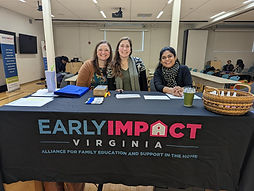Join Us to Advocate for Parents & Children!
Advocacy Day 2026 at the General Assembly!
Mark your calendar for Families Forward Advocacy Day 2026 at the Virginia General Assembly on January 29th and/or February 4th! This year we'll meet at the Truist Building and then spend the day participating in advocacy meetings with legislators and staff, attending committee hearings, and taking a look at the proceeding of the oldest continuous legislative body in the country!
Participating in Advocacy Day is a great opportunity to talk to your representatives about the work of Families Forward and what it means to your community. However, it's not the only way! If you're not able to attend Advocacy Day, but are interested in other opportunities to share your message of support for Families Forward, let us know and we'll share information about additional opportunities when they become available.
Here are some helpful resources:
-
Families Forward Virginia Advocacy Days 2026 Handbook for staff
-
Recorded presentation providing an overview of the Advocacy Day Handbook 2026
-
Family Invitation to Advocacy Day in English and Spanish. (This resource can help you share information about Advocacy Day with parents you want to invite to attend.)

Advocacy Overview
What is Advocacy?
Advocacy is as basic as speaking on behalf of oneself or others to get something done. For example, as child advocates we seek to ensure that the children in our community have a voice and that their needs are met. This can mean speaking on behalf of children and families to your local community officials, your state-level elected officials, or your federal policy-makers.
Helpful resources include this Advocacy Guide.
Why Advocate for Families?
The most obvious reason to be a child and family advocate is that you care. You care about the children in our country and want them to be safe, healthy, and happy. It follows that you want to help ensure that local, state, and federal policy-makers adopt, implement, and maintain important policies and programs that support children families. In order to ensure that these policies and programs are maintained, it is critical to have a sustained vocal and noticeable presence at all levels of policy-making. You can be part of that presence; and therefore, you can be part of the effort to protect our nations children and families.
Decades of research have shown that the creation of positive childhood experiences can mitigate the effects of adversity. While brain science has helped us understand how adverse childhood experiences cause toxic stress for children, which can lead to poor health outcomes, we also know that positive childhood experiences protect adult mental health and promote healing from toxic stress.
Melissa T. Merrick PhD, President & CEO
Prevent Child Abuse America
Other Advocacy News
Scenes from Past Advocacy Days
.png)
.png)

.png)












